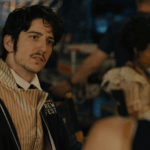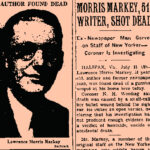Are Things Getting Better or Worse? A Conversation with Mike Pesca
Will Schwalbe Talks to the Host of The Gist
Will Schwalbe: Hi, I’m Will Schwalbe, and this is But That’s Another Story. Most booklovers have a go-to book or author when the weight of the world just gets a little too heavy to bear. I have one friend who always turns to P.G. Wodehouse. Another swears by the novelist Nancy Mitford. These days, as soon as she finishes Love in a Cold Climate, she starts on The Pursuit of Love. Then, like shampoo, it’s rinse and repeat.
For me, there’s only one author who can always get me out of a funk when the world is just too aggravating, and that’s Robert Benchley, who wrote for The New Yorker from the mid-1920s to the 1940s. He gave us immortal lines like, “Why don’t you get out of that wet coat and into a dry martini?” Among other things, Benchley was the patron saint of procrastination—and procrastinators. A classic curmudgeon, he looked at the world with a bemused eye and found it and himself lacking. But Benchley is at his best when he’s taking everyone around him to task for crimes like ice crunching, loud gum chewing, and talking obsessively and their vacations. I only wonder what quips he’d have for these times. But I must confess: I gain some comfort from knowing that things were bad then too. And if that’s the case, maybe things haven’t quite gone to hell in a handbasket. Maybe some things have been there all the while. And recently, I got to talking about what to read when you want to feel better about the world with today’s guest.
Mike Pesca: I’m Mike Pesca. I’m host of the Slate daily podcast The Gist, and I’m the author of Upon Further Review: The Greatest What Ifs in Sports History.
WS: Mike Pesca has always been good at talking and telling stories, and that’s come in handy for his storied career in radio—as a producer at WNYC’s On the Media, a correspondent for NPR, and now as the host of The Gist, which is on episode… oh, well over a thousand by now. And even as a kid, it wasn’t too hard to imagine that this is where he might end up.
MP: Friends of mine say, oh, I haven’t talked to you in a while, but I feel like I hear from you because your show is the essence of you, the distillation of you, so that’s a compliment. And it has never surprised anyone that this is what I’m doing. Like I’m one of those people where no one ever said, really? You? They’re like, yeah, okay. We didn’t know what podcasting was, but if someone had told me that there would be this thing called podcasting, I’d be like, oh, yeah. Mike Pesca should do that.
I was like other kids, only taller, smarter, and more vain. I grew up on Long Island. I was born in the driveway of the house my parents still live in. And when I say driveway, there was a 1968 Plymouth Barracuda in the driveway, and it was in that front seat that I was born.
My parents were both public school teachers, and I especially think my father, being a social studies teacher and being the kind of person who was really committed to current events, the news, fair-minded ingestion of right, left, always of thinking—that couldn’t have influenced me more.
WS: Another big influence was reading.
MP: My nose was always in a book, and I liked Vonnegut, I liked Catch-22. I just really loved magazine journalism, and I loved everything that P.J. O’Rourke did in Rolling Stone. And then I went back and kind of used him as a way into National Lampoon, and I read everything in National Lampoon. And I read this book on the history of college humor magazines. And I had no idea that college humor magazines even existed. And all I ever wanted to do from that point on was to go to college and write for my humor magazine, because I was so influenced by this idea and this institution. And I got to college and I opened one copy of the humor magazine and I said, this sucks! And I never wrote for them.
Another very formative thing for me was I was in the Model United Nations, as a lot of people are, and I remember going to the library—and this is the days before all the information was really readily available, so you would have to go through the card catalogs, but the huge books of periodicals. And this exposed me to things like Foreign Policy magazine, also Macleans, which is essentially the Canadian version of Time. And certain magazines or periodicals kept popping up, so I would go to the library and read these magazines and periodicals that I only got to know because of Model United Nations.
WS: And one of the other big things Mike was into as a kid should come as little surprise.
MP: I always loved radio and listened to radio and would drive to my aunt’s house in eastern Long Island or New Jersey and we’d listen to talk radio on the way there and back.
WS: But it didn’t stop with just listening to the radio. A big Jets fan, he started calling in to local sports programs when he was around ten years old.
MP: We tend to remember the thing we have a photograph of, even if we haven’t looked at the photograph in 20 years. So, I think I had one recording of one of my shows and that’s the one that I very much remember. This recording I haven’t heard in 20 years, but it’s just the one that I heard more than once, or the one I heard again, not as a participant. And it was me talking about Wesley Walker coming back from injury. He was a Jets receiver, and I offered my opinion that, Walker is a couple weeks back from injury, I don’t think he and Richard Todd have gotten their rhythm back. And the cohost of the show, who’s the linebacker, a member of the Jets, Greg Buttle said, “That’s it, that’s it, Mike from Oceanside, you’ve nailed it exactly. They don’t have their rhythm back yet.” So, it felt pretty good. And I found out later that Greg Buttle, the host of the show is a member of the Jets, was a little pissed off that I would call in every week and they made a big deal about it. They even had what’s called a sounder, which is like some sound effect that Mike from Oceanside is calling. He got really grumpy about it, that I was taking a little bit of the spotlight, but his cohost, or maybe there was a station director who was paying attention to such things knew that it was good radio.
WS: And Mike’s love of the beleaguered football team didn’t just lead him to radio—it also led him to approach the world in a somewhat counterintuitive way for a Jets fan: as an optimist.
MP: I told you I was a Jets fan, right? So that would lead you think, oh, he’s only experienced heartache and regret. But he still came back to being a Jets fan. I think that was the crucible in which I was formed.
I would say, I know my mother was certainly a pessimist and would tell me that her life philosophy is expect the worse and this way if it happens, you won’t be surprised, but if something good happens, you’ll appreciate it. I definitely thought that was an insane philosophy and I’d debate her on this. So I probably was an optimist if I had to put my finger on it.
WS: And as he stopped debating the merits of optimism versus pessimism with his mother, Mike started debating what he wanted to do with his life.
MP: When I was in college, I didn’t know exactly what I wanted to do. I knew I liked politics. But there was something about journalism that seemed really dry and uncreative and I was wrong about that but—two things. One, I think journalism was less creative then, but I also think that I didn’t realize how much you could bring creativity to non-fiction. So I said to myself, well, I love the news, and I love current events, but I just couldn’t see myself dedicating myself to being a reporter where all you can do to express yourself, or to show imagination, like, what can you do? You’re pretty constrained by actual events.
I remember having this thought and I had a couple friends who were journalists, and they got jobs at small papers. And it didn’t seem like they were doing terribly exciting things—they were just dutifully reporting the goings-on of local city councils. But there was something about NPR—which I didn’t listen to until after I graduated from college. I didn’t even know it existed, I don’t think. There was something about the raucous nature about sports radio, or the interesting nature of the interviews I was hearing on NPR. That to me, represented something like non-fiction plus creativity, plus communication/expression—that’s definitely something I should do.
WS: Mike started out as an intern at his local public radio station, WNYC, and quickly found out that working in radio was exactly where he was supposed to be.
MP: My first full-time job was with a show called On the Media, which was hosted by a guy named Alex Jones—okay, not that Alex Jones. Alex Jones, the Pulitzer Prize-winning journalist who won a Pulitzer for writing about The New York Times. So, back then, we were covering media in an interesting way. I thought it was an interesting topic, and there just wasn’t the crush of media coverage. I liked the subject matter and I liked the fact that I wasn’t just producing and writing questions or researching for someone else. Pretty soon, I was encouraged to go on air and do reports, and so I would get a slot here and there and then a slot every week, and eventually I became a producer at large, and that was great. That was. They’re great people to work with and it was a fun show to work on and a fun topic.
One of the first kind of big assignments, I was working for On the Media and John F. Kennedy Jr.’s plane crashed.
The producer of that show called me up and he said, what are you doing? He said, John F. Kennedy’s plane crashed. We need you to get over there. Where’s there? I don’t know, a crash somewhere in Long Island sound. And then we realized that much of the action’s going to be in Hyannis Port, so I take a ferry across to Hyannis Port—and this is just spur of the moment, rent a car, drive out there, take a ferry, drive to the Kennedy compound, do a story about, at least the scene at the Kennedy compound. I did nothing to book a hotel. I did nothing about logistics—I just jumped into the car and went. By the night and through the next day, I think I worked through the night. So, I was driving back over one of the bridges there up in Cape Cod, and I pulled onto a public park and there was a picnic table, and I laid down on the picnic table and I fell asleep for two hours. And when I woke up I said, this is the physically worst I have ever felt in my life. And I said, that’s journalism.
WS: Mike Pesca had been steadily working on media stories for radio when he started a new job on an NPR show called Day to Day. His assignment was report on, well, everything, and so he found himself paying a lot of attention to book reviews, regularly checking The Atlantic, The New Yorker, and The New York Times Book Review. And one book that was getting a lot of attention at that time stood out to him: The Progress Paradox, by Gregg Easterbrook.
MP: The Progress Paradox talks about the world as it is now, or as it was then—it’s about a 14-year-old book at this point. And it makes a couple points. One, things are a lot better than they’re given credit for, and the way it does this, I think, through the details, are really convincing and compelling and fabulous. Things are a lot better than people think. This confirmed a lot of feelings I had or thoughts I had, but he fleshed it out in a great way. And the second thing it does—it asserts not only are things better, but people really don’t give it credit. And he proves how pessimistic people are, and in survey data and psychological data, how people look at the world as a glass-half-empty place. That’s the cover of the book. It’s a half-empty glass of water.
I read the title of the book. I immediately gleaned what he was talking about. If I had any question, the subtitle—“how life gets better while people feel worse”—I said to myself, yes! I do think that happens! And then I started reading reviews of the book and I said, ooh! This seems to be the sort of book that I’m interested in. And I should also say that what really popped out at me was not, you know, general trends about growing GDP, it was more the specifics, such as the fact that he writes about how whole states, like Florida, couldn’t even exist without air conditioning. And yet, no one walks around saying, thank God for air conditioning, it made Florida possible—but maybe we should.
Another example of that—acid rain. It had a very horrifying sounding name, and you can accompany it with visuals of things that have been rotted a little bit by the so-called acid rain. And acid rain was a problem—the rain was acidic because of pollution. And it was really reported like this is not only going to kill all these fish in a lake, probably we’re all going to die from acid rain. And it wasn’t hype. It wasn’t exactly irresponsible. If nothing was done, we would all suffer consequences of acid rain.
This has been the story of humanity—up until now. But the story of humanity, all the time, as there were problems is thinking that this trend would at this moment stop. That we’re definitely going to have a nuclear war. We’re definitely going to have acid rain kill us. But the thing is, something was done! Not because something’s always done, but because quite often, human ingenuity looks at problems of the day and solves them!
WS: And for Mike, reading Easterbrook’s book not only confirmed much of what he already believed about the world—but it also made him think differently about his own work.
MP: I thought he wrapped it up well! After reading it, I said to myself, yeah! This is not only a good book in the specifics and the execution, this is the sort of nonfiction that speaks to almost every other work of nonfiction.
What this book did is it gave me sort of a ballast or a master script to deal with why this keeps happening. Why we ignore progress that’s going on. Why it’s deemed less newsworthy. Why you’ve never read a story—I’m going to assume—most people have never read a story on how we conquered acid rain. So there’s 10,000 stories about acid rain and the problem and there’s not one story about, hey, remember acid rain? Was that really a thing? Here’s what we did to beat it. And so I started looking more for—looking a little more askance at the stories that were, this horrible thing is going to kill us, and more for the interesting wrinkle of a story that kind of explains the world outside of this paradigm of intractable problem.
WS: And even years after reading The Progress Paradox, Mike still believes in its message.
MP: 2004 is a good time to write a book about how good things are, because things are pretty good in 2004. So, you know, if you write a book at the peak or near the peak of the good times, it’s easy to say times are good and people don’t realize it. However, Easterbrook did come out with a book last year that really shows all the trend lines, in general, are improving.
Barack Obama used to argue this all the time—there’s never been a better time to be a person on this planet. There’s never been a better time to be a randomly born person on this planet. Or, by the way, he would say, there’s never been a better time to be a randomly born person in America. And maybe during the Barack Obama administration, that was true. And maybe that’s less true in the last couple years. Or maybe, like Easterbrook says, it just doesn’t feel true because it’s never really felt true.
WS: And when the news of the day dips towards the depressing, that’s what Mike reminds himself.
MP: Most of the time, we trend towards progress. And in some cases, we believe that, most of the people who are most of the people who are really worried about the state of our democracy today—and you should be worried, and you shouldn’t put your head in the ground, and by the way, if we don’t do anything—just like if we didn’t do anything about acid rain—good things won’t happen. So it’s concerned people like you, who are active and worried about the world who are making it a better place. But, most of those kind of people will believe things like, the arc of history bends towards justice. And it also bends towards progress. And it’s not always such a slow arc. I mean, the book starts with saying, what if your great-grandparents came back to America today, what would they think? They would find it a bountiful wonderland, essentially. I mean no material shortages—that alone! And a state like Florida which can be air conditioned.
Whenever I express this philosophy to other people, they very frequently jump to, well you’re just going to sit back and think that good things will happen? Absolutely not. I don’t think that. Easterbrook doesn’t think that. I don’t think the people who are worried about the progress of the world think that anyone should sit back. The point is, we as a, as a people, as a species, don’t sit back. So, lean in—don’t sit back. But absolutely believe that things are possible. I think it’s self-defeating and inaccurate to think that these problems can’t be solved and that good things are not only impossible but actually haven’t been the rule, rather than the exception.
![]()
But That’s Another Story is produced by Katie Ferguson, with editing help from Alyssa Martino, Alex Abnos, and Becky Celestina. Music for this episode was by Alex Abnos. Thanks to Mike Pesca, Mary Wilson, and Pierre Bienaimé. If there’s a book that changed your life, we want to hear about it. Send us an email at AnotherStory@macmillan.com. We’ll be back with our next episode in two weeks.




















